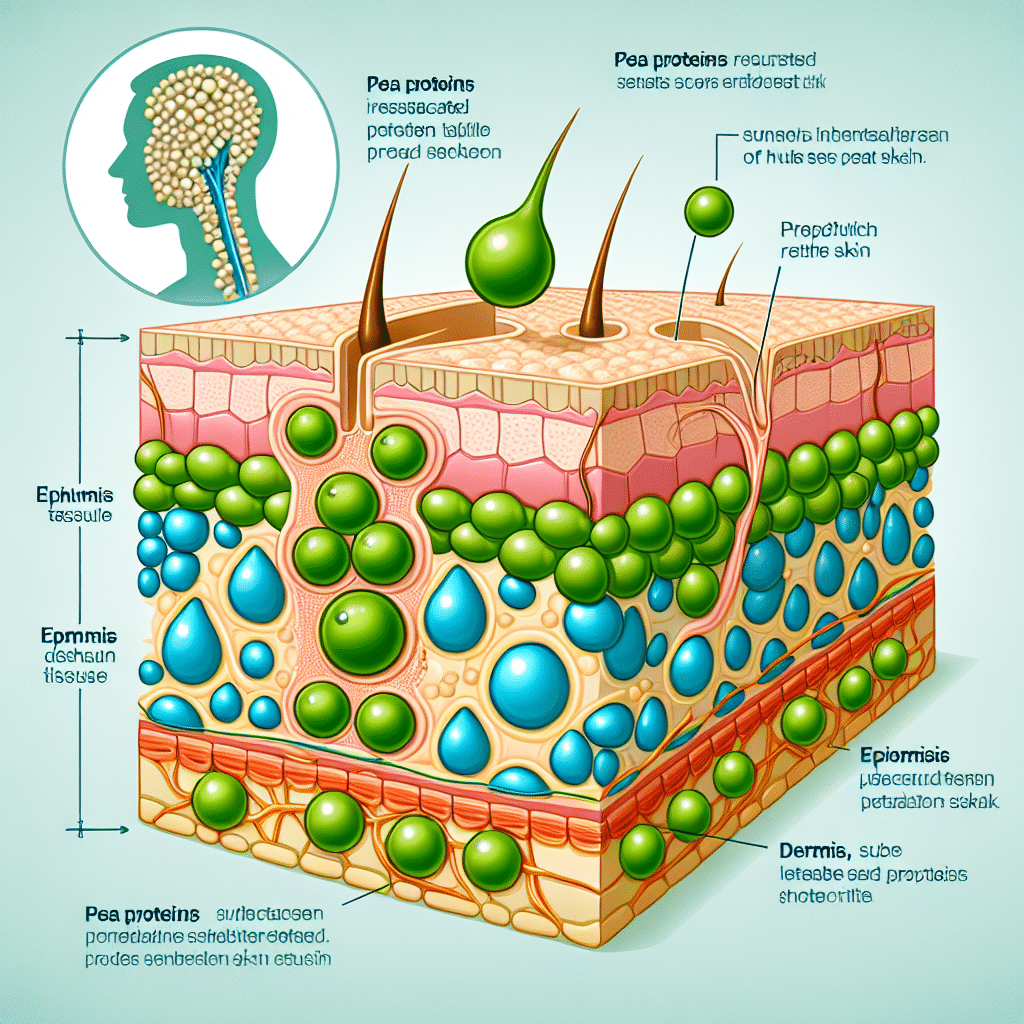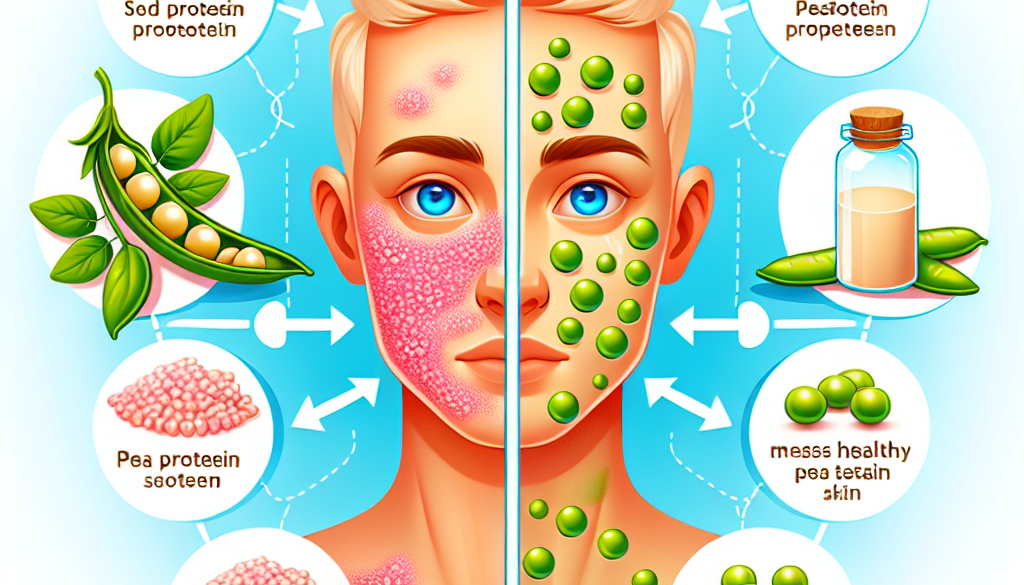Do Pea Proteins Affect Your Skin? The answer
Table of Contents
- Pea Protein and Skin Health: Uncovering the Connection
- The Nutritional Profile of Pea Protein
- Pea Protein and Skin Health: The Scientific Perspective
- Case Studies and Research Findings
- Personal Testimonies and Anecdotal Evidence
- Pea Protein in Skincare Products
- Considerations for Incorporating Pea Protein into Your Diet
- Conclusion: Pea Protein as a Skin Ally
- Discover ETprotein’s Premium Pea Protein Products
Pea Protein and Skin Health: Uncovering the Connection

As the quest for healthier lifestyles and dietary choices continues to gain momentum, pea protein has emerged as a popular plant-based alternative to traditional animal proteins. Its rise in popularity is not only due to its nutritional benefits but also because of its potential impact on skin health. This article delves into the effects of pea protein on the skin, exploring the science behind its influence and the implications for those seeking to maintain a radiant complexion.
The Nutritional Profile of Pea Protein
Before examining the direct effects of pea protein on the skin, it is essential to understand its nutritional composition. Pea protein is derived from yellow split peas and is a rich source of essential amino acids. It is particularly high in branched-chain amino acids (BCAAs) like leucine, isoleucine, and valine, which are crucial for muscle growth and repair. Additionally, pea protein contains arginine, which supports blood flow and heart health.
- High in protein content with low levels of carbohydrates and fat
- Rich in vitamins and minerals, including iron, which is often lacking in plant-based diets
- Free from common allergens such as lactose and gluten, making it suitable for individuals with dietary restrictions
Pea Protein and Skin Health: The Scientific Perspective
Proteins are the building blocks of the body, including the skin. They play a crucial role in the repair and regeneration of skin tissues. Pea protein, with its rich amino acid profile, may contribute to skin health in several ways:
- Collagen Production: The amino acids in pea protein can help in the synthesis of collagen, a vital protein that maintains skin elasticity and firmness.
- Antioxidant Properties: Some studies suggest that peptides derived from pea protein may exhibit antioxidant properties, protecting the skin from oxidative stress and environmental damage.
- Hydration: Pea protein contains hygroscopic amino acids that can help maintain skin hydration, leading to a plumper and smoother appearance.
Case Studies and Research Findings
While research on pea protein’s direct impact on skin health is still emerging, several studies have provided insights into its potential benefits:
- A study published in the Journal of Cosmetic Dermatology found that oral intake of pea protein hydrolysate led to improved skin elasticity in women.
- Research in the International Journal of Cosmetic Science has shown that certain peptides derived from pea protein can have anti-aging effects on the skin.
These findings, while preliminary, suggest that pea protein could be a valuable addition to a skin-healthy diet.
Personal Testimonies and Anecdotal Evidence
Many individuals who have incorporated pea protein into their diets report positive changes in their skin’s appearance. Anecdotal evidence from online forums and product reviews often highlights improved skin texture and reduced signs of aging. However, it is important to note that such personal testimonies should be taken with caution and not as definitive proof of pea protein’s benefits for the skin.
Pea Protein in Skincare Products
Pea protein’s potential benefits have not gone unnoticed by the skincare industry. It is increasingly being included in topical formulations such as creams, serums, and masks. The protein’s film-forming properties can provide a protective barrier on the skin, while its moisturizing effects can enhance the product’s overall efficacy.
Considerations for Incorporating Pea Protein into Your Diet
While pea protein can be a beneficial addition to your diet, there are some considerations to keep in mind:
- Quality of Protein: Opt for high-quality, non-GMO, and organic pea protein when possible to avoid potential contaminants.
- Dietary Balance: Ensure that pea protein is part of a balanced diet that includes a variety of nutrients essential for skin health.
- Individual Responses: As with any dietary change, pay attention to how your body and skin react to pea protein and adjust accordingly.
Conclusion: Pea Protein as a Skin Ally
In conclusion, pea protein holds promise as a beneficial component for skin health, thanks to its rich amino acid profile and potential collagen-boosting and hydrating properties. While more research is needed to fully understand its impact, current studies and anecdotal evidence suggest that pea protein can be a valuable addition to a skin-friendly diet. As with any dietary supplement, it is essential to consider individual responses and maintain a balanced nutritional intake.
Discover ETprotein’s Premium Pea Protein Products
If you’re looking to incorporate pea protein into your diet for its potential skin benefits, ETprotein offers a range of high-quality protein products. Their organic pea protein is characterized by a neutral taste, non-GMO, and allergen-free attributes, making it an excellent choice for those seeking to enhance their skin health through nutrition. Explore ETprotein’s offerings and experience the difference in your skin’s appearance and overall well-being.
About ETprotein:
ETprotein, a reputable protein and L-(+)-Ergothioneine (EGT) Chinese factory manufacturer and supplier, is renowned for producing, stocking, exporting, and delivering the highest quality organic bulk vegan proteins and L-(+)-Ergothioneine. They include Organic rice protein, clear rice protein, pea protein, clear pea protein, watermelon seed protein, pumpkin seed protein, sunflower seed protein, mung bean protein, peanut protein, and L-(+)-Ergothioneine EGT Pharmaceutical grade, L-(+)-Ergothioneine EGT food grade, L-(+)-Ergothioneine EGT cosmetic grade, L-(+)-Ergothioneine EGT reference grade and L-(+)-Ergothioneine EGT standard. Their offerings, characterized by a neutral taste, non-GMO, allergen-free attributes, with L-(+)-Ergothioneine purity over 98%, 99%, cater to a diverse range of industries. They serve nutraceutical, pharmaceutical, cosmeceutical, veterinary, as well as food and beverage finished product distributors, traders, and manufacturers across Europe, USA, Canada, Australia, Thailand, Japan, Korea, Brazil, and Chile, among others.
ETprotein specialization includes exporting and delivering tailor-made protein powder and finished nutritional supplements. Their extensive product range covers sectors like Food and Beverage, Sports Nutrition, Weight Management, Dietary Supplements, Health and Wellness Products, and Infant Formula, ensuring comprehensive solutions to meet all your protein needs.
As a trusted company by leading global food and beverage brands and Fortune 500 companies, ETprotein reinforces China’s reputation in the global arena. For more information or to sample their products, please contact them and email sales(at)ETprotein.com today.












